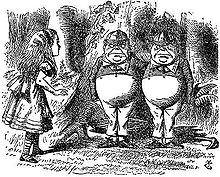
Back Съперничество Bulgarian Soupeření Czech Rivalität German Rivalo Esperanto Rivalidad Spanish هماوردی Persian ライバル Japanese 라이벌 Korean Rivalidade Portuguese Rival SIMPLE

A rivalry is the state of two people or groups engaging in a lasting competitive relationship. Rivalry is the "against each other" spirit between two competing sides. The relationship itself may also be called "a rivalry", and each participant or side a rival to the other. Someone's main rival may be called an archrival. A rivalry can be defined as "a perceptual categorizing process in which actors identify which states are sufficiently threatening competitors".[2] In order for the rivalry to persist, rather than resulting in perpetual dominance by one side, it must be "a competitive relationship among equals".[3] Political scientist John A. Vasquez has asserted that equality of power is a necessary component for a true rivalry to exist, but others have disputed that element.[4]
Rivalries traverse many different fields within society and "abound at all levels of human interaction",[5] often existing between friends, firms, sports teams, schools, and universities. Moreover, "families, politicians, political parties, ethnic groups, regional sections of countries, and states all engage in enduring rivalries of varying length and intensity".[5] Rivalries develop from the product of competition and ritualism between different parties. In some cases, rivalry can become "so consuming that actors worry only about whether their actions will harm or benefit their rivals".[5]
- ^ Cite error: The named reference
culturewas invoked but never defined (see the help page). - ^ Thompson, William R. (2001). "Identifying Rivals and Rivalries in World Politics". International Studies Quarterly. 45 (4): 557–586. doi:10.1111/0020-8833.00214.
- ^ Michael Brecher (May 26, 2016). The world of protracted conflicts. Lanham, Maryland. p. 11. ISBN 978-1-4985-3188-7. OCLC 1253439132.
{{cite book}}: CS1 maint: location missing publisher (link); citing Gary Goertz; Paul F. Diehl (June 1993). "Enduring Rivalries: Theoretical Constructs and Empirical Patterns". International Studies Quarterly. Vol. 37, no. 2. pp. 147–171. - ^ Michael Brecher (May 26, 2016). The world of protracted conflicts. Lanham, Maryland. p. 11. ISBN 978-1-4985-3188-7. OCLC 1253439132.
{{cite book}}: CS1 maint: location missing publisher (link) - ^ a b c Thompson, William R. (1999). Great power rivalries. Columbia, S.C. p. 3. ISBN 1-57003-279-3. OCLC 40142926.
{{cite book}}: CS1 maint: location missing publisher (link)
© MMXXIII Rich X Search. We shall prevail. All rights reserved. Rich X Search